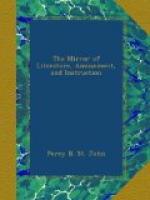’All which remains to be said of these excellent people is, that they appear to live together in perfect harmony and contentment; to be virtuous, religious, cheerful, and hospitable, beyond the limits of prudence; to be patterns of conjugal and parental affection; and to have very few vices. We remained with them many days, and their unreserved manners gave us the fullest opportunity of becoming acquainted with any faults they might have possessed.’
* * * * *
ANECDOTE GALLERY.
* * * * *
Religious works do not usually unbend so pleasantly as in the following, from the Christian’s Magazine:—
Joseph II. Emperor of Germany.—In one of those excursions which this emperor frequently took incog. he proceeded to Trieste. On his arrival, he went into an inn, and asked if he could be accommodated with a good room? He was told, that a German bishop had just engaged the last; and that there were only two small rooms, without chimneys, unoccupied. He desired a supper to be prepared. He was told there was nothing left but some eggs and vegetables, the bishop and suite having engaged all the poultry. The emperor requested that the bishop might be asked if he would allow a stranger to sup with him. The bishop refused, and the emperor supped with one of the bishop’s almoners, who was not admitted to his master’s table. The emperor asked him what they were going to do at Rome? “My lord,” replied the almoner, “is going to solicit a benefice of fifty thousand livres, before the emperor is informed of its being vacant.” They changed the conversation. The emperor wrote a letter to the chancellor of Rome, and another to his ambassador there. He made the almoner promise to deliver both letters, agreeably to their address, on his arrival in Rome. He kept his promise—the chancellor presented the patent for the benefice to the astonished almoner!
* * * * *
Character of Dr. Wilson, Bishop of Sodor and Man.—This eminent prelate was venerable in his aspect, meek in his deportment, his face illuminated with benignity, and his heart glowing with piety: like his divine master he went about doing good. With the pride and avarice of prelacy he was totally unacquainted. His palace was a temple of charity. Hospitality stood at his gate, and invited the stranger and beggar to a plenteous repast. The day he devoted to benevolence, and the night to piety. His revenue was dedicated to the poor and needy; and, not contented




